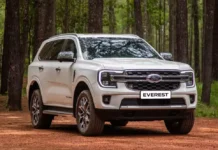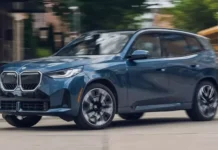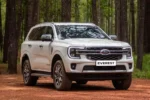A recent announcement from the Paris city government states that bigger cars today are leading to overloaded infrastructure. The size and weight of vehicles have increased, resulting in overcrowding, especially on narrow roads and in parking spaces in the city. Meanwhile, Americans prefer larger vehicles, including pickup trucks and SUVs, as the highways and space here have been well developed since the 1950s.

According to JATO data in 2003, the average length of passenger cars in the US was about 5,000mm. For reference, this is the length of a luxury sedan like the Mercedes-Benz E-Class. The average width in that year was 1,864mm. In 2013, the average length increased to 5,158mm and the width increased to 1,927mm. This was a period when pickup trucks and SUVs truly became popular in the automotive market. But 10 years later, everything is still growing, leading to a record average in 2023.
Last year, the average length of light passenger vehicles in the US reached 5,232mm, with the average width going up to 1,958mm. This is just a few millimeters away from a brand new Mercedes-Benz S-Class, and what is noteworthy is that the size increase is not related to larger families. In fact, the annual population growth in the US has decreased from 0.96% in 2003 to 0.50% last year. The increase in car size is more related to comfort, convenience, and safety standards.

In contrast to the preference for larger cars in the US, Europe has a tradition of buying smaller cars. The cities here were formed long before cars appeared, explaining why parking is a challenging task. In addition, Europe has less energy self-sufficiency compared to the US, forcing drivers to conserve fuel consumption.

However, the popularity of large SUVs cannot be denied, even among European consumers. In 2003, a few years before SUVs became popular on the continent, the average length of a passenger vehicle was 4,312mm, while the average width was 1,734mm. That can be compared to a brand new Volkswagen Golf. In 2013, the size increased significantly to 4,419mm in length and 1,796mm in width. And last year, everything in Europe was bigger than ever: precisely 4,533mm and 1,841mm.
Sơn Phạm (forum.autodaily.vn)
How Many Aston Martin DBX 707 – The World’s Fastest V8 SUV – Have Arrived in Vietnam? What is the Selling Price?
The Aston Martin DBX 707 is renowned for being one of the fastest SUVs in the world. As a result, wealthy Vietnamese entrepreneurs have quickly placed orders for this high-speed SUV. According to our information, at least 3 Aston Martin DBX 707 vehicles have been imported into the country, all of which are completely authentic and officially sourced.
How much does an SUV fleet appear on a street in Hanoi?
On a weekend afternoon, the famous Dao Tan Street in Hanoi witnessed the presence of four luxury SUVs. These vehicles, including Rolls-Royce Cullinan Black Badge, Rolls-Royce Cullinan standard edition, Aston Martin DBX, and the latest generation Range Rover, all had one thing in common – their owners chose to register them with white license plates. It was an impressive sight that showcased the opulence and prestige of these high-end SUVs.













































